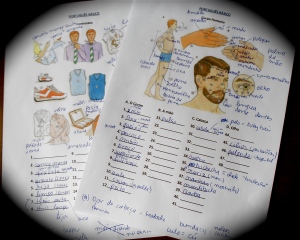I’ll be forever envious of people lucky enough to have grown up in environments that fostered multilingualism. I was dealt a rather poor hand on that front. Nobody in my family had had any significant exposure to foreign languages, nor had anyone continued their schooling past the age of 14. Sure, they supported the concept of learning enough to get a ‘good’ job that would earn you a steady living, but education was not seen as an end in itself, and the kinds of professional jobs requiring higher education were not for ‘people like us’.
Shunted onto the wrong track aged ten
Things started going pearshaped for the dormant linguist in me when I completed primary school. At that stage, your scholastic performance thus far determined whether you had above average academic ability or not. If so, you then had the choice of attending a certain kind of school which would eventually lead you to university, and in line with this aim, it also offered high quality foreign language teaching. I had the right grades, but unfortunately, none of my friends did, and when I asked my parents what to do, I was told that it was up to me. Well, when you’re ten, you just want to be with your friends, and I was no different. Back then, the German education system was rigid as hell, and there would be no coming back from that ill-fated decision.
Like all German pupils at that time, I started learning English as a second language aged 11. And I liked it! But we only had English lessons a couple of hours a week, with teachers who, despite being well qualified as teachers, would probably have struggled to hold a decent conversation in English in a real life setting. Some were downright incompetent. I remember one particularly hopeless individual whose ‘lessons’ consisted of making us copy grammar chapters from the text book into our exercise books. Years later, I learned that she had killed herself. Twenty years too late, I remember thinking when I read about it in the paper.
French foiled, Russian GO!
When I was 14, the school gave each of us the choice to study either French or IT. My father convinced me to opt for computing, as he thought this was going to be more useful in the future. I could see his point, but it turned out to be a complete waste of time. My heart wasn’t really in it, and we had to share one computer between three people. I didn’t learn squat, and promptly gave it up in the coming year. By then, I had missed the French train 😦
Something else did come up, however: Russian. Ironically, it was offered by the neighbouring school that I could have been attending, had I not made that crappy decision a few years back. My Dad, supportive of my linguistic exploits as ever, refused to give me the money for the book I needed. It was 14 bucks 80, the price label will be forever etched into my brain. My aunt bought it for me, and I spent a couple of glorious years learning a few scraps of Russian on Friday afternoons.

Miraculously, my parents did fork out so I could go on a school trip to Moscow in the spring of 1988 with my Russian class
English boost
In the meantime, it had dawned on me that I wasn’t going anywhere with my English. Classes at school consisted of drumming in grammar and vocabulary by rote. There was no opportunity to practice either speaking or listening. Bizarrely, the school had an expensive ‘language lab’ into which we were ushered once a year, to stare in reverence at the booths equipped with headphones and mics. Nobody did anything in there the rest of the time.
How the hell was I ever going to learn to talk and understand spoken English?!? Something had to be done. Luckily, I had managed to get myself a job babysitting for some neighbours. The mother of my two charges was a lovely, educated woman from South Carolina, who could clearly see all of my life’s frustrations. A deal was struck. I would help her son with his German homework in exchange for English conversation lessons. We remain good friends to this day.
Around the same time, I developed an interest in learning Spanish and Portuguese, but there were only evening classes available in a town just a few miles away. I could have gotten myself there on the bus, but not back home again – there was no public transport after 7pm in the Bavarian outback. I asked my father if he would collect me, but making a 20 minute round-trip once a week was just too much of an imposition.
Scuppered one last time
At 16, my full-time schooling (geared towards producing paper-shuffling office monkeys) came to an end. It was decision time once again.
What I really wanted to do at this point was to get into a specialist language school so I could train as a translator. One small problem… there was only one state-funded school within geographic reach, and it had an entrance exam. I was competing with people who had gone to the ‘right’ school, studied English for three years longer than I with far superior teaching. I sat the exam, but it was futile… I failed.
There was also a private school I could have attended, charging a fee of 800 bucks per annum, which was well within my family’s financial means. (I calculated once that my father spent three times that much on cigarettes each year). But of course, he refused to spend a dime on something he deemed to be a complete waste of time. (I.e. any kind of further/higher education for girls.)
Being a minor with no accessible funds of my own, I had little choice but to take on a mindnumbing but ‘secure’ office job. This entailed attending school once a week for the three longest years of my life – a hallmark of Germany’s famed dual-track education system – where I was bombarded with more boring tosh, like how to file alphabetically and enter numbers into an accounts ledger. This being Germany, there was an exam to pass at the end. Two days after taking that blasted exam, on 15 July 1991, I was on a plane to the UK to start a job kindly arranged by the kind people I’d been babysitting for and who had taught me the basics of English conversation. Oh yes, we had been busy plotting my escape.
It was another decade before I actually saw the inside of a university, but I had flown the coop, in direction of an English-speaking country! That was good enough for now.
(As an aside, I am a smidgen consoled by the fact that I did grow up ‘somewhat’ bilingual. My native language, if you will, is Bavarian, a dialect of German that is virtually unintelligible to people from outside the region. I even met somebody from my neck of the woods in Toledo where I live now, the owner of a small bar, and every time I walk in, he insists on speaking Bavarian, because there’s nobody else in town who can indulge him.)
You may also be interested in my specialist language blog, see here: http://multilingualbychoice.blogspot.com

 No, for a Spanish speaker, frutos secos is this:
No, for a Spanish speaker, frutos secos is this:









